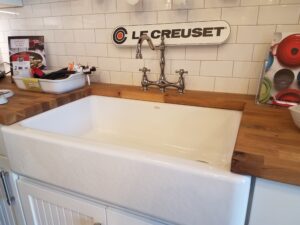
What do solid wood countertops cost?
Bear with me. This’ll take a minute, but if you’re shopping for countertops I believe you will find this time well spent. First and foremost,

Don’t let cheap wood countertops cost you $$$
The stakes are too high – CafeCountertops is the smart investment Here’s what will go wrong, and how; and how to buy smarter. There’s often

Custom Wood Countertops
In rural homes, where natural beauty and durability are key, custom wood countertops offer a timeless and functional solution. Unlike mass-produced materials, custom wood countertops
Butcher Block Countertops
When designing a modern kitchen, homeowners are increasingly looking for materials that balance aesthetics, functionality, and sustainability. Butcher block countertops have gained popularity as a
Custom Wood Extending Tables
Custom wood extending tables have emerged as a versatile and stylish solution for modern living spaces, seamlessly combining practicality with aesthetic appeal. As sustainability and
Floating Wood Shelves
In 2025, home design is taking a modern and eco-friendly turn, with sustainable living at the forefront of interior trends. Among the standout elements reshaping
Solid Wood Countertops
Solid wood countertops have long been cherished for their timeless beauty, durability, and versatility in kitchen and bathroom designs. As homeowners and designers increasingly prioritize
Floating Shelves
Floating shelves have become a popular choice in modern interior design, and for good reason. Their sleek, minimalist look offers both aesthetic and practical benefits.

